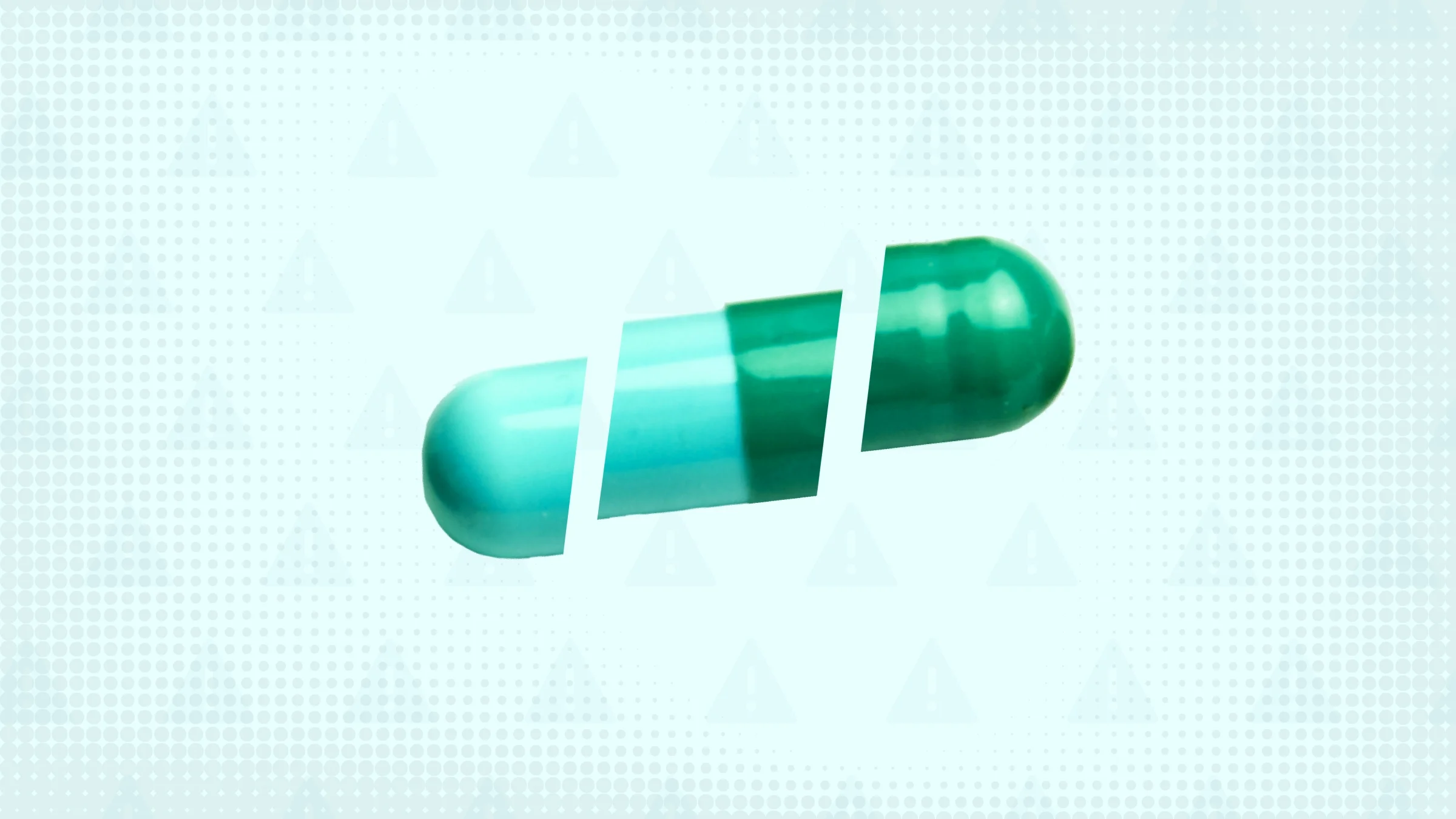Key takeaways:
Hydroxyzine (Vistaril) is a medication prescribed for itching and sometimes for anxiety. It has a number of potential side effects to know about before taking it.
Common hydroxyzine side effects include drowsiness, dizziness, and dry mouth. Headaches and constipation can happen, too. But these side effects are generally mild and can be managed at home.
Less common but serious hydroxyzine side effects include a higher risk of falls and heart rhythm problems. Discuss these risks with your prescriber.
Save on related medications
Hydroxyzine (Vistaril) can ease itching related to allergies. And it’s also sometimes prescribed for the relief of anxiety, though it’s not a first-choice medication for this purpose. There are two forms of hydroxyzine — hydroxyzine hydrochloride and hydroxyzine pamoate. These forms work similarly and carry similar risks and warnings.
If you’ve been prescribed hydroxyzine, you might be curious about its potential side effects. Most hydroxyzine side effects, such as drowsiness and dry mouth, are mild. And many people can manage them at home with lifestyle changes. So what hydroxyzine side effects should you know about?
Hydroxyzine side effects at a glance
Below are lists of common and rare but serious hydroxyzine side effects.
Search and compare options
Common or mild hydroxyzine side effects include:
Drowsiness
Dizziness
Dry mouth (xerostomia)
Headache
Mild rashes
Constipation
Blurred vision
Less common but serious hydroxyzine side effects and risks include:
Excessive dizziness or drowsiness
Confusion
Higher risk of falls, especially for adults 65 and older
Trouble urinating (urinary retention)
Worsening of certain types of glaucoma
Low blood pressure (more likely to happen if you take too much hydroxyzine)
Abnormal heart rhythms
Convulsions
Hallucinations (seeing or hearing things that others don’t)
Allergic reactions
Serious skin rashes or reactions
These aren’t the only possible hydroxyzine side effects. Contact your prescriber about unusual or bothersome side effects — even if they’re not listed here.
Below are more details about 12 hydroxyzine side effects and tips for managing them.
1. Drowsiness
Drowsiness is a very common hydroxyzine side effect. It happens because the medication can pass the blood-brain barrier. This is a group of cells that controls what does and does not enter the area surrounding the brain. Some medications can get through this barrier.
Hydroxyzine is a first-generation antihistamine, similar to diphenhydramine (Benadryl). It works by blocking histamine, a chemical in the body that plays a role in allergic reactions. By blocking histamine, hydroxyzine causes allergy symptoms to lessen or stop.
But, like other older antihistamines, hydroxyzine can pass the blood-brain barrier. And this can lead to drowsiness. Older antihistamines cause this side effect more often than newer ones, such as fexofenadine (Allegra).
When you first start taking hydroxyzine, avoid activities that need your full attention, such as driving, until you know its effects. You should also avoid other medications and substances that can worsen drowsiness. Examples include opioids, benzodiazepines, and alcohol.
Things to avoid: Some medications and substances can worsen certain side effects of hydroxyzine (Vistaril). Read more about hydroxyzine interactions and how to manage them.
Hydroxyzine doses: Your prescriber may lower your dose to help reduce certain side effects. Learn about typical hydroxyzine dosages here.
Hydroxyzine for anxiety: Pharmacists discuss how hydroxyzine works for anxiety and what to expect while taking it.
Some people may only need to take hydroxyzine once a day. If this is the case for you, try taking your hydroxyzine dose at bedtime. This can help limit drowsiness during waking hours.
If you’re taking hydroxyzine more than once a day and it’s causing you to feel sleepy during the daytime, talk to your prescriber. You may need a lower dosage of hydroxyzine or a different medication to manage your symptoms. But talk to your prescriber before making any changes to your medication regimen.
2. Dizziness
Dizziness is also a common hydroxyzine side effect. Like drowsiness, dizziness happens because hydroxyzine crosses the blood-brain barrier.
You may be more likely to experience dizziness if you also take other medications that cause dizziness. Examples of these medications include antidepressants and blood pressure medications. Check with your pharmacist to find out if your current medications can cause or worsen dizziness.
You should avoid drinking alcohol while taking hydroxyzine. Combining the two can also worsen dizziness.
If you do experience dizziness while taking hydroxyzine, try these tips to help manage it:
Find a place to sit or lie down until dizziness passes.
Take your time when changing positions, such as going from sitting to standing.
Drink plenty of water or other fluids to stay hydrated.
Eat a small snack.
If dizziness doesn’t get better or go away, talk to your prescriber. They may recommend a lower hydroxyzine dose or a different medication to manage your symptoms.
3. Dry mouth
Dry mouth is another common hydroxyzine side effect. Besides blocking histamine, hydroxyzine also blocks a chemical called acetylcholine. When a medication does this, it causes what’s called anticholinergic side effects. Dry mouth is one of many anticholinergic side effects that can occur when taking hydroxyzine.
Dry mouth related to hydroxyzine is usually mild and able to be managed at home. If you experience this side effect, there are steps you can take to help relieve it, including:
Sucking on ice chips
Drinking cool liquids throughout the day
Chewing sugar-free gum or sucking on sugar-free hard candy
Trying an over-the-counter (OTC) saliva substitute, such Biotene or BioXtra
If at-home remedies like the above don’t work, talk to a healthcare professional. They may recommend that you stop taking hydroxyzine or that you try a prescription medication for dry mouth.
4. Headache
Headaches are another common hydroxyzine side effect. In fact, headaches are a possible side effect of all antihistamines. Typically, headaches are mild. And, if you take hydroxyzine regularly, they may improve over time.
If you have headaches while taking hydroxyzine, there are some home remedies you can try to get relief:
Be sure to drink plenty of water and other fluids.
Exercise regularly, or try to add more movement into your daily routine.
Make sure you’re getting enough sleep at night.
Take steps to lower your stress levels with activities such as meditation or breathing exercises.
You can also ask your prescriber or pharmacist about taking an OTC pain reliever, such as ibuprofen (Advil, Motrin) or acetaminophen (Tylenol). These can be helpful for occasional headaches. If your headaches don’t seem to get better or become severe, talk to your prescriber about next steps.
5. Constipation
Constipation is another potential hydroxyzine side effect. Like dry mouth, constipation is an anticholinergic side effect. Blocking acetylcholine slows the movement of food through the intestines. And this can lead to constipation in some people.
Constipation from hydroxyzine is usually temporary. To relieve constipation at home, try drinking more fluids and slowly adding more fiber to your diet. If this doesn't work, you can talk to a pharmacist about trying OTC medications for constipation, such as laxatives or stool softeners.
Check in with a healthcare professional if your constipation doesn’t improve after a few days. And if it’s severe or gets worse at any point, contact your prescriber right away.
6. Higher risk of falls
Hydroxyzine can raise the risk of falls, especially in older adults. Some of the other side effects discussed above — such as drowsiness and dizziness — may contribute to the risk of falling, as well. To be safe, experts recommend adults ages 65 and older avoid taking older antihistamines, such as hydroxyzine.
Be sure to discuss your options with a healthcare professional. There are allergy medications that carry a lower fall risk, such as loratadine (Claritin). There are also lower-risk anxiety medications available, such as buspirone.
If you and your prescriber determine hydroxyzine is right for you despite the risks, ask about other steps you can take to help prevent falls.
7. Eye problems
Hydroxyzine can cause different eye-related side effects. These include blurred vision (a common side effect) and worsening of glaucoma (a serious side effect).
Blurred vision
Blurred vision is another example of an anticholinergic side effect that hydroxyzine can cause. Acetylcholine plays a role in tear production and eye muscle movement. When hydroxyzine blocks acetylcholine, it disrupts these actions. This can lead to blurred vision.
Most times, blurred vision is temporary and improves over time. Avoid performing tasks that require focus, such as driving, until you know if hydroxyzine causes blurred vision for you. If this side effect doesn’t get better, tell your prescriber.
If blurred vision happens with other symptoms, such as eye pain or vision changes, seek medical help right away. These can be symptoms of more serious eye problems, such as worsening glaucoma.
Worsening of glaucoma
One rare but serious hydroxyzine side effect is worsening of glaucoma. The technical term for this side effect, which can occur with all antihistamines, is acute angle-closure glaucoma. It’s a medical emergency and can lead to permanent blindness in severe cases and if left untreated.
People with narrow-angle glaucoma have the greatest risk of this side effect. But to be safe, tell your prescriber if you have any type of glaucoma before taking hydroxyzine.
If you have blurry vision, eye pain, or see halos around bright lights while taking hydroxyzine, seek medical help. These are possible symptoms of acute angle-closure glaucoma.
8. Trouble urinating
Trouble urinating is another potentially serious hydroxyzine side effect. As with some of the above, trouble peeing is an anticholinergic side effect. You may feel like you can’t fully empty your bladder or, possibly, have lower stomach pain.
People with an enlarged prostate may have a higher risk of this side effect with hydroxyzine. There’s also a higher risk when hydroxyzine is combined with other medications that cause trouble urinating, such as amitriptyline or oxybutynin.
Unaddressed urinary retention can become serious and lead to bladder or kidney infections. So if you experience this hydroxyzine side effect, talk to your prescriber. They may suggest that you try a different medication.
9. Heart rhythm problems
In very rare cases, hydroxyzine has been known to cause irregular heart rhythms (arrhythmias). It’s one of many medications that can prolong (lengthen) the QT interval, or the time between two heartbeats. Lengthening the QT interval can lead to severe or life-threatening arrhythmias.
People with certain heart problems may have a greater risk of abnormal heart rhythms related to hydroxyzine. Taking hydroxyzine with other QT-prolonging medications may also raise your risk. Some examples of these medications are antipsychotics and certain antibiotics, such as ciprofloxacin (Cipro).
Let your prescriber know if you have a heart condition before you start taking hydroxyzine. And make sure they know what other medications and supplements you take. They’ll help you weigh the risks and benefits of taking hydroxyzine.
10. Convulsions
Convulsions are a rare but serious hydroxyzine side effect. Studies suggest that older antihistamines, such as hydroxyzine, may raise the risk of seizures. Certain groups of people may be at a higher risk of this hydroxyzine side effect. These may include children and those with a history of seizures.
Inform your loved ones that seizures are a possible side effect of hydroxyzine. This way, they can be prepared to help keep you safe from injury if one occurs. If you start experiencing convulsions, a family member should try to get you to a safe area and into a safe position. They should help you to lie on your side on the floor with a cushion under your head. If your seizure lasts longer than 5 minutes or if you have repeated seizures, your loved one should call 911.
If you experience convulsions while taking hydroxyzine, tell your prescriber. They may suggest that you stop taking it.
11. Serious skin reactions and rashes
Rarely, hydroxyzine can cause a serious skin reaction called acute generalized exanthematous pustulosis (AGEP). This is a rare condition in which people experience a rash with blisters and redness. Sometimes AGEP can cause itching and fever.
Contact your prescriber right away if you notice a skin reaction or rash after taking hydroxyzine. They may recommend that you stop taking it and seek further care. They may also prescribe other medications to manage the rash.
12. Allergic reactions
While rare, it’s possible to have an allergic reaction to hydroxyzine. These can range from mild to life-threatening. If you’ve had a reaction to other antihistamines in the past, tell your prescriber before starting hydroxyzine.
Possible symptoms of allergic reactions may include:
Rash
Hives
Itching
Nausea
Diarrhea
Wheezing
Swelling of the face, lips, or tongue
Trouble breathing
If you experience more mild symptoms, such as hives or itching, contact your prescriber right away. They may want to evaluate you in person. And they can let you know if you should seek further medical care.
If you experience severe or life-threatening symptoms, such as trouble breathing, call 911 or go to the nearest ER.
Frequently asked questions
Hydroxyzine’s effects may start to wear off about 4 hours after taking a dose. But small amounts of the medication may stay in your system for about 4 to 5 days. However, children’s bodies tend to clear hydroxyzine faster than adult bodies. The medication is typically out of a child’s system within about 1 to 2 days.
Hydroxyzine interacts with many medications. You shouldn’t take it with other antihistamines, such as diphenhydramine. And you should be cautious about combining it with alcohol or other medications that cause drowsiness or dizziness. Examples include opioids, benzodiazepines, and sleep medications. Be sure to share a full medication list with your prescriber and pharmacist. This can help them check for potential hydroxyzine interactions.
Possibly. Weight gain isn’t a listed side effect on hydroxyzine’s labeling. But some studies suggest that antihistamines may increase your appetite and lead to weight gain for some people. However, more research is needed to confirm if certain antihistamines are more likely than others to impact body weight. If you’ve gained weight since starting hydroxyzine and are uncomfortable with it, tell your prescriber.
Hydroxyzine’s effects may start to wear off about 4 hours after taking a dose. But small amounts of the medication may stay in your system for about 4 to 5 days. However, children’s bodies tend to clear hydroxyzine faster than adult bodies. The medication is typically out of a child’s system within about 1 to 2 days.
Hydroxyzine interacts with many medications. You shouldn’t take it with other antihistamines, such as diphenhydramine. And you should be cautious about combining it with alcohol or other medications that cause drowsiness or dizziness. Examples include opioids, benzodiazepines, and sleep medications. Be sure to share a full medication list with your prescriber and pharmacist. This can help them check for potential hydroxyzine interactions.
Possibly. Weight gain isn’t a listed side effect on hydroxyzine’s labeling. But some studies suggest that antihistamines may increase your appetite and lead to weight gain for some people. However, more research is needed to confirm if certain antihistamines are more likely than others to impact body weight. If you’ve gained weight since starting hydroxyzine and are uncomfortable with it, tell your prescriber.
The bottom line
Hydroxyzine (Vistaril) is an antihistamine used for itching and sometimes anxiety. Common hydroxyzine side effects include drowsiness, dizziness, and dry mouth. Headaches and constipation can also occur. Serious hydroxyzine side effects include a higher risk of falls and heart rhythm problems.
Hydroxyzine may not be right for certain people, such as those who have a heart condition and older adults. Check with your prescriber or pharmacist for tips on how to manage hydroxyzine side effects.

Why trust our experts?


References
2023 American Geriatrics Society Beers Criteria Update Expert Panel. (2023). American Geriatrics Society 2023 updated AGS Beers Criteria for potentially inappropriate medication use in older adults. Journal of the American Geriatrics Society.
Amneal Pharmaceuticals. (2024). Hydroxyzine hydrochloride - hydroxyzine tablet, film coated [package insert].
Glaucoma Research Foundation. (2022). When people with glaucoma should avoid allergy and decongestant medications.
Kim, J. H., et al. (2024). First-generation antihistamines and seizures in young children. JAMA Network Open.
MedlinePlus. (2019). Histamine: The stuff allergies are made of.
MedlinePlus. (2023). Hydroxyzine overdose.
Moore, M. J., et al. (2023). Acute generalized exanthematous pustulosis. StatPearls.
National Institute of Diabetes and Digestive and Kidney Diseases. (2019). Definition and facts of urinary retention.
National Institute of Diabetes and Digestive and Kidney Diseases. (2019). Symptoms and causes of urinary retention. National Institutes of Health.
PubChem. (2025). Hydroxyzine. National Library of Medicine.
RemedyRepack. (2025). Hydroxyzine pamoate - hydroxyzine pamoate capsule [package insert].
Sam, C., et al. (2023). Physiology, acetylcholine. StatPearls.
Schlit, A., et al. (2017). Risk of QT prolongation and torsade de pointes associated with exposure to hydroxyzine: Re‐evaluation of an established drug. Pharmacology Research & Perspectives.


















